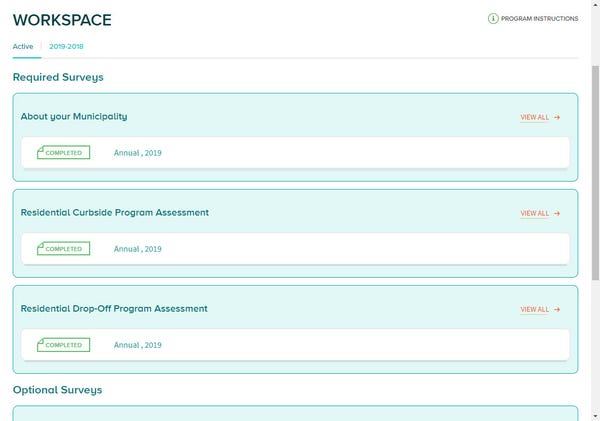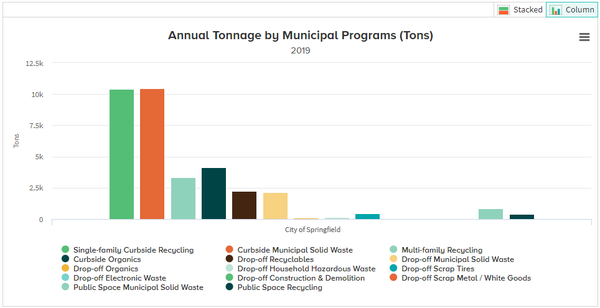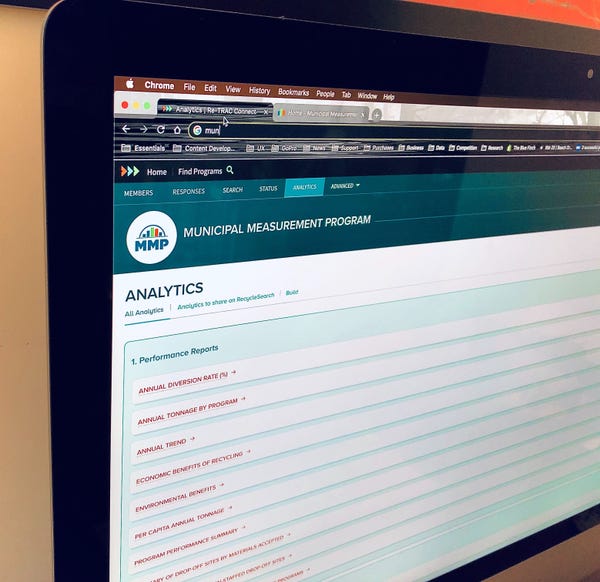Software Resource Supports Waste Management Through Data and Best Practices

Winnipeg, Manitoba-based environmental tech company Emerge Knowledge has developed web-based software to help waste management professionals collect, manage, and analyze recycling and municipal solid waste data.
The company pitches this resource, which it has branded Re-TRAC Connect, as a cost-effective alternative to paper forms, computer spreadsheets, and other traditional data collection methods.
The software includes a tool called the Municipal Measurement Program (MMP) that is free to U.S. and Canadian municipalities and counties. The MMP leverages data that municipalities enter into Re-TRAC about their material management practices so that they can analyze the results. It gives users visibility into their own outcomes and enables them to benchmark against other participating municipalities.
Over 260 communities participate in the MMP.
“The MMP is intended to provide municipalities with a robust and accessible materials management program analysis and planning tool,” says Josh Reid, municipal services manager for Re-TRAC Connect.
Users receive actionable recommendations in areas where they need insight, based on how they responded to surveys, and are able to access these surveys on the Re-TRAC platform. Additionally, they gain access to an analytics section housed on Re-TRAC with more than 10 reports categorized as performance reports, benchmarking reports, and program recommendations.

These analytic reports enable municipalities to monitor material flows, capture rates, and the economic benefits of recycling. With this data, municipalities can make more informed decisions about their waste diversion and recycling programs, Reid says.
The Recycling Partnership (TRP), a national nonprofit organization, helped develop this industry resource. Among its contributions, TRP determined metrics to gauge in the surveys, such as pounds per household generated, and it provides recommendations based on users’ survey responses.
“If they want to learn about contamination rates, for example, the MMP will provide customized recommendations,” says Chris Ronson, senior sales and marketing manager for Re-TRAC Connect. “And they compare and contrast them against other jurisdictions to be able to benchmark against other MMP participants.”
Ronson says the program addresses a common problem in the municipal solid waste space: sharing results among jurisdictions in a consistent and comparable way.
“We created standardized reporting forms, and we ensure everyone uses the same language through definitions that are displayed as they fill out forms,” Ronson says. “We also worked to make it user-friendly with tool tips and program guides. And we have webinars that explain how to complete the program assessment surveys.”

Among the performance metrics that municipalities can compare against other MMP participants are combined curbside & drop-off diversion rate, curbside diversion rate, drop-off diversion rate, pounds per household by program, and curbside contamination rate.
ReTRAC’s Reid says the project benefited greatly from The Recycling Partnership’s contribution.
“It’s a good collaboration, because we know how to collect and display data, and The Recycling Partnership brings industry experience as far as knowing what metrics will be most relevant,” Reid says.
One of the most popular offerings of the MMP, which is sold as a subscription, is the Government Data Management Plan (GDMP), which provides visibility into data that cities, states, counties and solid waste districts require for decision-making and regulatory purposes.
Among the benefits of the GDMP are the automation of tasks that provide the ability to flag inconsistent data. The system also allows users to communicate directly with municipalities with questions and enables them to assess program performance and understand how each municipality in the regulator’s jurisdiction is addressing material management challenges.
“The GDMP is a great solution for state agencies that want to get started quickly with local government reporting but don’t have the time or budget to design a brand new program,” says Jennifer Milner, state recycling coordinator for the Mississippi Department of Environmental Quality.
Re-TRAC is a preferred provider of the Solid Waste Association of North America’s Affinity program, which offers resources to SWANA members.
“Re-TRAC provides useful software solutions that help local governments better manage and analyze their recycling-related data,” says David Biderman, executive director and CEO of SWANA.

SWANA’s recent renewal of the Affinity relationship expands the program to include the GDMP.
“With recycling being such an important component of local governments’ solid waste programs, it’s essential for localities to have accurate, actionable recycling data,” Biderman says.
About the Author
You May Also Like




.png?width=300&auto=webp&quality=80&disable=upscale)